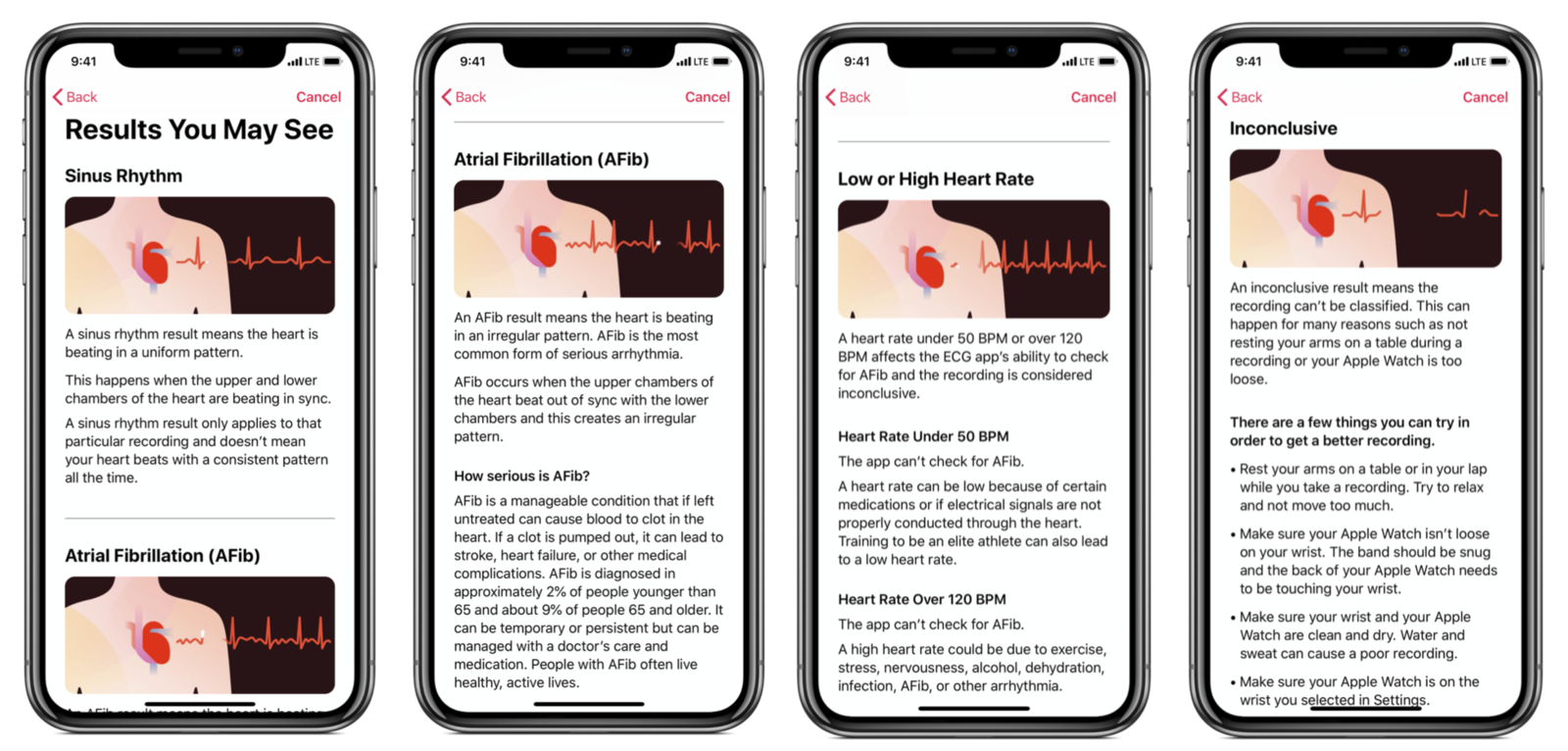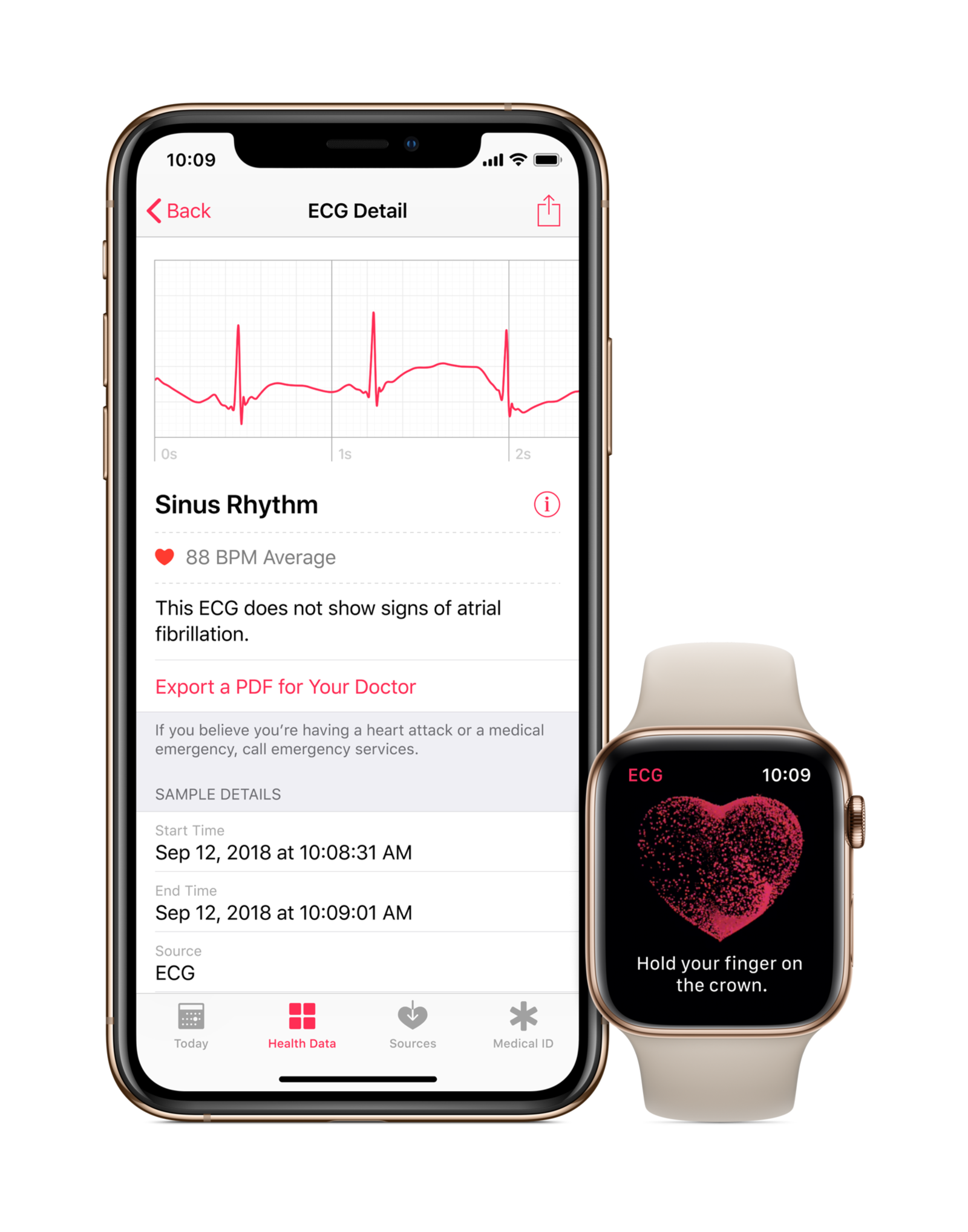The new heart-monitoring features of the Apple Watch, which roll out today in the United States, are in no way equivalent to a visit with a cardiologist. This is obvious, or should be, because Apple explains it in excruciating detail before you can even begin using them. These features arrive at market with the endorsement of the American Heart Association and after a big-ass study conducted with the help of Stanford University. They are slick, easy to use, and, in my limited experience with them, relatively accurate compared to a heart study I had done a few years ago.
And that’s really all you need to know. For people who care about their health and like the Apple Watch, the electrocardiogram app and AFib Notification are another good thing about the Apple Watch. They will inevitably save someone’s life by inspiring a medical workup that would not have otherwise occurred. If that life is yours, they will be best thing ever. If it isn’t, they’ll be more of a...novelty. And on the flip side, of course, someone may well get a false positive, get scared out of their Allbirds, and be really, really mad.
So here’s what we're talking about. There’s a Food and Drug Administration–cleared single-lead ECG monitor (sorry, Apple Watch Series 4 only) and accompanying notification system for atrial fibrillation (AFib), the most common form of irregular heart rhythm. The watch intermittently analyzes heart rhythm in the background and sends a notification if it detects an irregular heart rhythm on five rhythm checks in a certain time.
Some will roll their eyes at this. They will note that Apple’s single lead ECG is not a true ECG, which uses 12 leads (leads are electrodes placed on the body surface). They will argue that it can’t detect heart attacks. They will make wisecracks about the app’s rigorous disclosure and consent onboarding process which very carefully, painstakingly frees Apple of any legal liability.
The point here is not that the watch can’t do a medical-grade ECG — it’s that it can do an ECG at all.
To those people I say this: It’s a fucking watch. The point here is not that the watch can’t do a medical-grade ECG — it’s that it can do an ECG at all.
If I had told you 10 years ago that your watch could perform an ECG good enough to win de novo clearance from the FDA you would have cried nonsense. You might even have cried nonsense five years ago — especially if I explained that the ECG circuit would be completed by touching the watch crown with a fingertip, allowing electrical signals across the heart to be measured.
Even if you didn’t dismiss this ridiculous idea of a heart watch back then, would you also have imagined that this device could make phone calls and stream music and give wrist tap directions and allow us to send crude and sometimes obscene fingertip drawings to other people with the same watch? I mean, I don’t think you would have? Sorry.

But that’s not the point. The point is that with these new heart features, Apple has, for some, raised the value proposition of the Apple Watch. Have those features transformed the device into an “intelligent guardian of your health,” as Apple claims? What do you think? I think “guardian” is doing a lot of work in that sentence. Perhaps the device is a guardian of your health in the same way a friend who looks at a sun spot on your arm and says “You might want to get that checked out” is a guardian of your health.
Certainly, that seems to be the opinion of cardiologists who are largely divided over whether the risk of unnecessary treatment and needless what-the-hell-is-going-on-with-my-heart anxiety is worth catching a few undiagnosed heart ailments.
Ethan Weiss, a cardiologist at UCSF Medical Center in San Francisco, worries about overdiagnosis and overtreatment. “The question here is whether this will have a negative impact on some patients and/or their doctors,” he told BuzzFeed News. “The answer there is probably yes.”
That said, Weiss said he is excited by the Apple Watch's ECG technology (“super cool”). “I try to think about where it can be useful to me and my patients,” he said. “Right now I am focused on using it as a tool to monitor for rhythm problems in people where there is not already a solution or where the current solution is not great. For that, I see it as a way to capture rare symptomatic events or eventually (maybe) as a way to capture rare asymptomatic events.”

In other words: It’s a work in progress. In the meantime, the Apple Watch’s ECG app is a fun thing to play around with — AFib notifications excluded. Thanks to the ECG app, I now know that my heart rate is normal; the app classifies heart rhythm as either AFib, sinus rhythm (normal), or inconclusive. More importantly, I also know that my heart rate decreases when I pet my dogs, increases when we are about to publish a big story, and increases even more when I get an unexpected call from our editor-in-chief. I knew these things already, but it’s fun to have charts proving it.
The Watch Series 4, the only Apple device that can perform an ECG, starts at $399. That's hardly a trivial sum. But it's also significantly less than most any hospital-grade monitoring device in the medical world. And it's a piece of equipment so small you could ostensibly lose it in a desk drawer.
That kind of engineering is truly a marvel — sobering, too. And in our current moment, where some tech behemoths are grappling with the unforeseen consequences of their creations, it's something worth interrogating. As Weiss notes, the Apple Watch's new heart-monitoring features could conceivably cause false positives and increased hospital visits; they could create currently unknowable ripple effects. There's no question that the device is powerful and potentially revolutionary in its design, but the question these days is not whether these companies can engineer this stuff, but whether they've really, truly thought it through.
Anyway ...
When I showed a doctor friend of mine a printout of some of ECG scans I did with the Apple Watch, he raised an eyebrow and did that thing where you sigh heavily and vibrate your lips. There's a history of heart issues in my family, and it was clear there would be some calculus in his reply. “Don't get preoccupied with these things,” he said. “But if you get a weird one, call me.”
